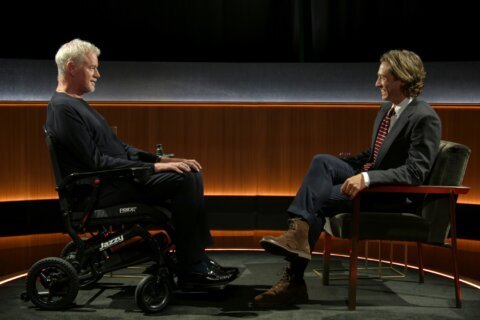If you’re planning a visit to the Reflecting Pool in the heart our nation’s capital this summer, you might want to schedule it for the first and third Fridays of every month, from 5-8 p.m.
That’s when you can catch free “Music at the Monument” concerts at the Lincoln Memorial, the new location for a series previously held at the Washington Monument’s Sylvan Theatre.
“Music at the Monument is a collection of events put together to unite the veterans, the youth and the larger community in the Washington D.C. area,” emcee Javier Starks told WTOP. “Imagine 10,000 to 15,000 people scattered across the Lincoln Memorial at any given time. It could be hundreds of school kids visiting from Florida, California, wherever. And when the music starts, you’ve got people dancing, just hanging out or lounging by the Reflecting Pool.”
The performances appeal to all different tastes.
“It’s the full spectrum,” Starks said. “There isn’t a genre of music that isn’t represented at Music at the Monument. It’s a mixture of all different types of music. It’s really cool. We had salsa last week and coming up soon we’ll have an orchestra. We have a youth choir. It really is a mixture between country, blues, jazz, hip-hop, a little bit of everything. We do it all.”
How did Starks get the hosting gig in the first place?
“I feel so fortunate,” Starks said. “A friend of mine mentioned they were doing events down [there], so I went over and talked to the owners who were running the event. They were like, ‘We’ll have you come perform. You seem pretty cool.’ I stuck around and would help fix things, put things together, pack up and move equipment after the show, and they were like, ‘Hey, maybe he could do that all the time.’ That evolved into me not only helping out but also hosting every show, and now I’m on the board of directors for their nonprofit organization.”
It’s just the latest venture in a career filled with hustle and vision.
“My mom and my dad are both disabled veterans, so we moved a bit when I was a kid,” Starks said. “I spent a lot of time growing up in Baltimore and Montgomery County, then I came out to D.C. to do music-related things. … There’s not much music happening in Gaithersburg compared to D.C., Chocolate City, everything is happening down here. So I came down here for my art and I teach as well in my free time at Georgetown Day School off MacArthur Blvd. I’m actually a substitute, which gives me the flexibility to go to New York or wherever.”
That includes a recent Kennedy Center concert and a four-show stint at New York’s Blue Note Jazz Club with drummer Karriem Riggins, who has worked with J Dilla of A Tribe Called Quest, De La Soul, Erykah Badu and August Greene featuring Common and Robert Glasper.
“It’s just wonderful to work with so many Grammy-winning musicians,” Starks said. “I’m working with a bunch of super talented musicians who produce records for anyone you can think of, from Kendrick Lamar to Rihanna. I did a song with Logic. … The goal is just to make music that I feel, that’s real to me, so I talk about my days being homeless in D.C., but also songs about how I’m happy, enjoying life, that I get to travel, how music took me to Africa last year, music has me here at the Lincoln Memorial, hip-hop has taken me around the world.”
Along the way, he promotes a movement of curse-free hip-hop like Arrested Development — the opposite of Eminem’s diss, “Will Smith doesn’t have to cuss in his rap to sell records.”
“All of my music is curse-free and positive, so that my students can involve,” Starks said. “I went through a heavy party phase and I was looking at what led to that. My perspective on the whole curse-free positive music is not because cursing is wrong. We’re all human, I curse as well, just not in my music. I started dissecting what we were doing as people, what we were listening to and I was like, ‘The music is influencing us!’ No one I knew was doing anything before the music. Yeah, we’re humans, we make our own decisions, but it definitely helped.”
That’s when he had a realization about the type of artist he wanted to be.
“I was like, what if I take music and create an alternative? Not something preachy or corny — like go to school, kids, do your homework — I still talk about life, politics, spirituality, love, the gamut. It’s very real. I just don’t go out of my way to glorify that we’re making money, or things we’re doing in the street, or degrading women. The goal is just to do it differently, just show them you can be different like, ‘Hey, kid, if you want to rap about soccer, there’s a large crowd of people in the world who would love that.’ They don’t understand that because all they see is the same message in music, especially in hip-hip, so my goal is to create an alternative.”
Not only can it inspire kids, it’s accessible to older generations at weddings and barbecues.
“That’s the goal: to be able to reach a larger audience, to be able to connect with the world,” Starks said. “It’s sad because hip-hop is such a beautiful art form and there are people who will not listen to hip-hop because of the stigma that, ‘Oh, it’s negative, it’s drugs, it’s sex, it’s violence,’ but, yo, hip-hip is so much bigger than that! I want to be a representative of that.”
All the while, he appreciates the symbolism of doing it on the steps of the Lincoln Memorial.
“MLK!” Starks said. “Gosh, ‘I Have a Dream’ was there. When I’m there living out my dream in the place where MLK spoke about the dream he had and I’m surrounded by people from different countries, different places, different ethnic backgrounds, all different types of people and we’re just enjoying the day, I find myself on the microphone saying, ‘It’s a beautiful day!'”
Find more on the Music at the Monument website. Hear our full chat with Javier Starks below:








